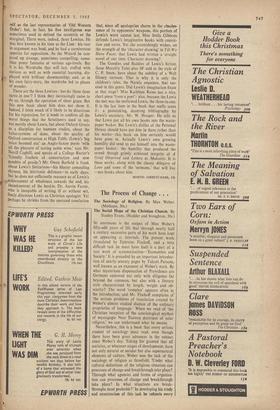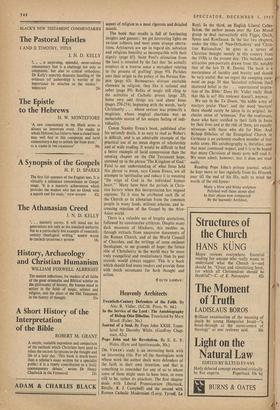The Process of Change . . .
So enormous is the output of Max Weber's fifty-odd years of life that through nearly half a century successive parts of his work have kept on appearing at intervals. The present work (translated by Ephraim Fischoff, and a very difficult task he must have had) is a part of a vast work of systematisation—'Economics and Society.' It is preceded by an important introduc- tion of nearly seventy pages by Talcott Parsons, well known as an exponent of Weber's work. By what Mysterious dispensation of Providence are Germans endowed not only with diligence far beyond the common, but also with a literary style characterised by length, weight and ob- scurity? The word 'complex' appears often in the introduction, and Mr. Fischoff complains of `the serious problems of translation created by Weber's almost studied disdain of the ordinary proprieties of language.' When we read of 'the Christian reception of the soteriological mythos of mystagogic Near Eastern doctrines of solar religion,' we can understand what he means.
Nevertheless, this is a book that every serious student of sociology must read, even though there have been great advances in the subject since Weber's day. Taking for granted that all societies, at whatever stages of development, have not only natural or secular but also supernatural elements of culture, Weber sees the task of the sociology of religion as threefold. 'Under what cultural definitions of the religious situation can processes of change and breakthrough take place? Through what agencies and forms of organisa- tion can processes, of change and breakthrough take place? In what situations are break- throughs most probable?' In developing his study and examination of this task he subjects every aspect of religion to a most rigorous and detailed search.
The book that results is full of fascinating insights and guesses: we get interesting lights on various subjects and meet some strange aberra- tions. Aristocrats are apt to regard sin, salvation and religious humility as incompatible with their dignity (page 85). Saint Paul's alienation from the land is revealed by the fact that 'he actually employs in a reverse sense a metaphor relating to the process of grafting' (page 95). Parishes owe their origin to the policy of the Persian Em pire (page 63). Bureaucrats distrust excitable elements in religion; they like it rational and sober (page 89). Relics of magic still cling to the activities of Catholic priests (page 25). Some very odd things are said about Jesus (pages 270-274), beginning with the words, 'early Christianity . . . whose saviour was primarily a magician, whose magical charisma was an ineluctable source of his unique feeling of indi- viduality.'
Canon Stanley Evans's book, published after his untimely death, is as easy to read as Weber's is difficult, and is an admirable example of the practical use of no mean degree of scholarship and of wide reading. It would be difficult to find a better example of lucid compression than the opening chapter on the Old Testament hope, summed up in the phrase 'The Kingdom of God.' Fatal to our understanding of what Jesus held this phrase to mean, says Canon Evans, are all attempts to `spiritualise and reduce it to meaning "the reign of God in the individual human heart."' Many have been the periods in Chris- tian history when this interpretation has reigned supreme. To it may be attributed such ills of the Church as its alienation from the common people in many lands, militant atheism, and in- creasing rejection of the Gospel by the Afro- Asian world.
There is a valuable use of lengthy quotations, followed by constructive criticism. Despite many dark moments of blindness, this enables us, through extracts from successive documents of the Roman Church, and of the World Council of Churches, and the writings of some eminent theologians, to see grounds of hope; the future role of Christianity in the world may be more truly evangelical and revolutionary than its past records would always suggest. This is a book which should find many readers and provide them with much sustenance for both thought and action.
► f GLYN LANDA V :







































 Previous page
Previous page